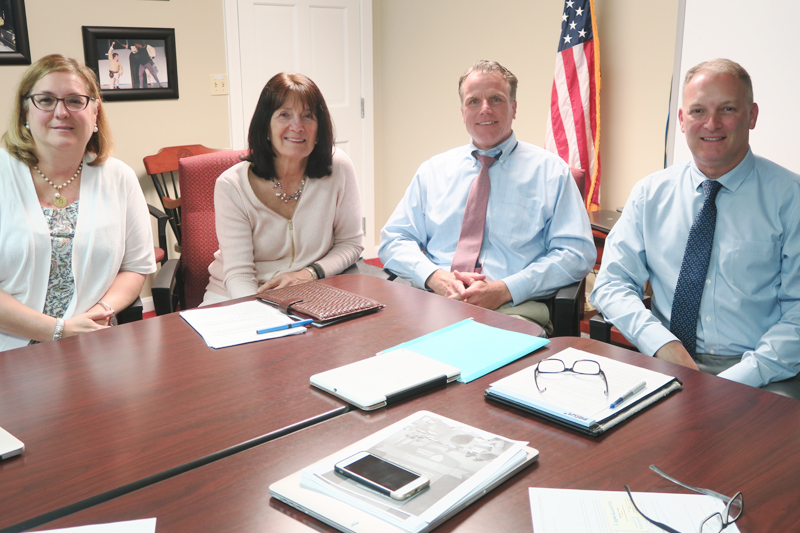Cape administrators discuss drugs, alcohol, tobacco, choices
A wide-ranging discussion this week with Cape Henlopen School District Superintendent Bob Fulton, Assistant Superintendent Cathy Petitgout, Supervisor of Elementary Education Donna Kolakowski and Supervisor of Secondary Education Michael Young focused on drug awareness and education in our schools.
With Delaware taking a hard look at legalizing marijuana for adult use, and a heroin epidemic presenting grave problems, this is a good time to take a look at how our schools prepare students to deal with the realities of our world.
The discussion also went deeper into developing student skill sets for making good decisions and the benefits of fostering a caring community in and out of the school environment.
“We have become a society where everything is fixed by a pill,” said Petitgout. “But clearly we’re not going to fix everything that way. We’re trying to develop a myriad of skill sets so our students become better problem solvers as a result. So they won’t see turning to drugs or alcohol as a way to address disappointments or problems. Every day there is something new on the horizon - some new drug or something. We can’t teach them everything, but we can equip them with skills for vetting things to make healthier choices, to make them better at critical thinking.”
Petitgout said a Girls on the Run program in Milton’s elementary schools which encourages running is an example of a program offering alternatives. “And now we have men in the community there who are doing a similar program with the boys.”
Young said Cape’s teachers at all levels are in tune with warning signs from students. “They may be presenting in a way that is unusual. Teachers will share that information - not to put a student on the spot or get them in trouble but out of a true concern to help. Concern, not anger - and going through the proper channels to help - not ignore.”
Kolakowski noted that an annual University of Delaware survey of elementary, middle school and high school students on drugs, alcohol and other social issues provides good information for where efforts are needed.
The good news, said Young, is that over the years since the survey was started - in about 2004 - use of and experimentation with drugs has declined. In particular, tobacco use and giving it a try are declining at the greatest pace. On the other hand, marijuana use and experimentation has shown a modest uptick in the last couple of years.
The state, said Kolakowski, sets standards for presenting drug, alcohol and tobacco concepts starting with kindergarten classes and continuing through high school. Most of the direct education comes through physical education classes. There’s a lot of material to be covered, but physical education classes meet for only 45 minutes once a week.
“There’s so much we’re expected to teach to the kids, but it’s tough to get it all in,” said Fulton. “Our physical education teachers are among our most engaging teachers, but they still have a lot to cover in a short amount of time.”
At the kindergarten level, focus is on short- and long-term benefits and risks of medicine and harmful effects of tobacco. Tobacco focus continues through high school, which may account for the steady decline of use showing up in the surveys.
Young noted that health classes become more structured at the middle and high school levels with weekly classes. “Substance abuse, underage drinking and problems with prescription and over-the-counter drugs get attention in those classes. There is also a unit called ‘Marijuana - Does Legal Mean Safe?’” said Young.
Keeping tabs on trends
Fulton said the district tries to keep tabs on what drugs in particular are being abused in our area.
“We talk about what students can do to avoid them, and our wellness center at the high school is a big player. We present a before-prom speech focusing on drugs and alcohol, and one time a year we do an unannounced K-9 dog search in our schools. Not even the board of education members know when those sweeps occur until the dogs are actually released. I really think it is a surprise search.”
“We’re trying to be consistent with the knowledge we’re presenting about drugs and alcohol,” said Young, “and making sure students know where they can go for support.”
Kolakowski said a recent Drug Awareness Week in the elementary schools helped develop an understanding of what is out on the streets and how to make good choices. And a big health fair in Milton was well attended.
“We really do have a supportive community,” said Fulton. “The police agencies and the chiefs all want to be a part of it in a positive way. We have a number of officers in the Milton, Lewes and Rehoboth Beach departments who have been through our system and know what it’s all about.”
Fulton said it disturbs him that the schools don’t have all the answers. “It’s frustrating. New stuff pops up all the time, and drugs are a concern. But they are not a huge concern for us. The biggest concern is mental health issues, and to that extent I think drug use is a symptom. That’s why we shifted from school counselors to social workers many years ago because we can’t control what goes on at home, but we can be aware of the problems, to help as much as we can. Of course the environment at home can include drugs, and that’s why we want the students to be aware and to be able to make good choices.”
Kolakowski said there is great emphasis among teachers and administrators to build relationships with kids and families. “That enhances everything,” she said.
Petitgout also confirmed the approach. “There’s a saying that goes something like ‘the students don’t care until they know that you care,’ and that goes for caring for the parents too.”
Fulton said it’s hard to pinpoint exactly how the schools are doing but he thinks teachers, social workers in each of the elementary schools, wellness center nurses, and physical education teachers are doing a good job sending a clear message.
“I think it’s working. We have a higher graduation rate than most districts, higher test scores and higher attendance. At the opening day of school this year, when we met with 1,000 staff members, we confirmed that the people we hire are people who care - people who are happy at what they are doing and how important it is for students to have something to look forward to. Some of our students are just trying to make it through the day, and school may be the only thing they look forward to. But we want that experience to give them something to hope for.
“We’re encouraged that people want to be part of the Cape district, and we want that positive feeling to make it through to the students. We have the highest retention rate for teachers of any public school system in the state. Many tell us that their goal is to be in the Cape district, to work here,” said Fulton.
“I think the staff is buying in,” he said. “We constantly remind ourselves that we’re here because of those 5,000 little ones in our classrooms.”

















































